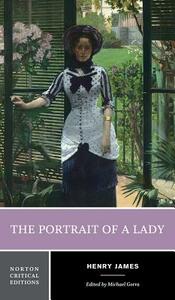Take a photo of a barcode or cover
mr james psychology'd so hard into his characters I feel like he came out the other end
featuring. a remarkably pathetic & unpleasant character named caspar goodwood
featuring. a remarkably pathetic & unpleasant character named caspar goodwood
More fun than I expected. Could have been shorter, though. I'll often think of you, Isabelle.
challenging
emotional
reflective
tense
slow-paced
Plot or Character Driven:
A mix
Strong character development:
Yes
Loveable characters:
Complicated
Diverse cast of characters:
Yes
Flaws of characters a main focus:
Yes
What an ending!
This book is magnificent but sadly falls short of 5 stars for me because I felt like the first 3/4 of the book dragged too much for me.
The Portrait of a Lady really is just that–an incredible portrait of a bright young woman who finds herself entangled in European politics. Henry James is brilliant in his use of light and shadow to draw out the characters. You don't know what people's motivations are, how they know each other, or what they're really thinking. The somewhat fantastical biographical nature of this book allows us hear character's thoughts while still feeling like an observer. It's absolutely brilliant.
The most remarkable part is what he did with the character of Madame Merle. She goes from intriguing, to "wicked," to unbelievably sympathetic. I did not see that twist coming!
This book is magnificent but sadly falls short of 5 stars for me because I felt like the first 3/4 of the book dragged too much for me.
The Portrait of a Lady really is just that–an incredible portrait of a bright young woman who finds herself entangled in European politics. Henry James is brilliant in his use of light and shadow to draw out the characters. You don't know what people's motivations are, how they know each other, or what they're really thinking. The somewhat fantastical biographical nature of this book allows us hear character's thoughts while still feeling like an observer. It's absolutely brilliant.
emotional
reflective
sad
medium-paced
Plot or Character Driven:
Character
Strong character development:
Yes
Loveable characters:
Complicated
Diverse cast of characters:
No
Flaws of characters a main focus:
Yes
"She rested her weariness upon things that had crumbled for centuries and yet still were upright; she dropped her secret sadness into the silence of lonely places, where its very modern quality detached itself and grew objective, so that as she sat in a sun-warmed angle on a winter's day, or stood in a mouldy church to which no one came, she could almost smile at it and think of its smallness."
-------------------
This was so close to 5 stars, but some of the slower paced scene setting and character descriptions bored me to tears.
I found it so interesting that the novel as a whole metamorphized along with Isabel. It began as a fairly light, whimsical, and silly story- especially the wry humor in dialogue. As she got further from her self and deeper entangled in others' plots/intrigue, the tone of the novel became more serious and melancholy.
I also loved the parallel of Touchett Sr. and Ralph Touchett dying at Gardencourt, an unchanging place, but Isabel underwent extreme challenges and changes and so she herself was almost an entirely other person, echoing the actions but not the sentiments of the earlier death in the novel. This made the contrast even more clear.
What she was most afraid of, losing her freedom, came to pass in part out of the ignorance/arrogance of youth. Each of the women in Isabel's life represented a distinct kind of womanhood- all held up in sequence as potential lives for Isabel. In the end, she chose none of them.
There was also a kind of bitter irony that Ralph's intention to free Isabel through financial independence was the thing that led to her capture. Without her wealth, Osmond would never have pursued Isabel. It seems James wanted to lay the blame foremost with Osmond, because he gives us sympathetic insight into Mme Merle's motives and wretchedness, but really they all played a part.
-------------------
This was so close to 5 stars, but some of the slower paced scene setting and character descriptions bored me to tears.
I found it so interesting that the novel as a whole metamorphized along with Isabel. It began as a fairly light, whimsical, and silly story- especially the wry humor in dialogue. As she got further from her self and deeper entangled in others' plots/intrigue, the tone of the novel became more serious and melancholy.
What she was most afraid of, losing her freedom, came to pass in part out of the ignorance/arrogance of youth. Each of the women in Isabel's life represented a distinct kind of womanhood- all held up in sequence as potential lives for Isabel. In the end, she chose none of them.
Ugh, what an ending. I cannot decide whether I loved it (the ending) or hated it. The book is fine, with rich and complex characters and a peek at the iceberg that comprises a woman's relationships with men. Particularly relevant to me just now with regard to the bonds one makes, and being only as good as ones word.
It will take me a few days to recover from what I just read, but overall I completely adore this piece of artwork.
Before anything else, I must say that this is not a book for those who don't like stories which seem without happenings and it is not a book for those who don't like very long descriptions. Above all, this is not a book for one's who don't like unresolved endings.
Henry James portraited not just Isabel Archer but also every other character in the book and he did it in the most excellent way possible. All of these characters will live in my head for ages, for decades. I will remember this writer not just for that, but also for his amazing descriptions of Isabel's (and others') emotions. A reader can relate to at least one of her feelings and situations.
This novel will remain timeless for its beautifully constructed scenery, characters, ideas of independence, free spirt, love and importance of friendship and marriage. To me, it will remain timeless because of something that tortures me for a very long time, which can be formed in a question like this: Why does a remarkable person, especially woman, has to suffer from crimes and malignant brains of other people?
Before anything else, I must say that this is not a book for those who don't like stories which seem without happenings and it is not a book for those who don't like very long descriptions. Above all, this is not a book for one's who don't like unresolved endings.
Henry James portraited not just Isabel Archer but also every other character in the book and he did it in the most excellent way possible. All of these characters will live in my head for ages, for decades. I will remember this writer not just for that, but also for his amazing descriptions of Isabel's (and others') emotions. A reader can relate to at least one of her feelings and situations.
This novel will remain timeless for its beautifully constructed scenery, characters, ideas of independence, free spirt, love and importance of friendship and marriage. To me, it will remain timeless because of something that tortures me for a very long time, which can be formed in a question like this: Why does a remarkable person, especially woman, has to suffer from crimes and malignant brains of other people?
reflective
slow-paced
Plot or Character Driven:
Character
Strong character development:
Complicated
Loveable characters:
Complicated
Diverse cast of characters:
No
Flaws of characters a main focus:
Yes
James writes his antagonists horridly well, that i couldn’t bear the vehement hatred i felt for the main two while i read it! not to mention that the protagonist herself is so very realistic and overall human - she makes mistakes and has faults and virtues, as most human beings do. she’s imperfectly perfect. a really good read!







